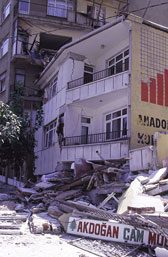|
GEOLOGY ARTICLE
Earthquakes
by MIKE BALDWIN

|
07.18.01--Earthquakes strike suddenly, violently and
without warning. Identifying potential hazards ahead of
time and advance planning can reduce the dangers of
serious injury or loss of life from an earthquake.
|
Checks for hazards in the home.
O Fasten shelves securely to walls.
O Place large or heavy objects on lower shelves.
O Store breakable items such as bottled foods, glass, and
china in low, closed cabinaets with latches.
O Hang heavy items such as pictures and mirrors away from
beds, couches, and anywhere people sit.
O Brace overhead light fixtures.
O Repair defective electrical wiring and leaky gas
connections. These are potential fire risks.
O Secure a water heater by strapping it to the wall studs and
bolting it to the floor.
O Repair any deep cracks in ceilings or foundations. Get
expert advice if there are signs of structural defects.
O Store weed killers, pesticides, and flammable products
securely in closed cabinets with latches and on bottom
shelves.
Identify safe places in each room.
O Under sturdy furniture such as a heavy desk or table.
O Against an inside wall.
O Away from where glass could shatter--around windows,
mirrors, pictures, or where bookcases or other heavy furniture
could fall over.
Locate safe places outdoors.
O In the open, away from buildings, trees, telephone and
electrical lines, overpasses, or elevated expressways.
Make sure all family members know how to respond after an
earthquake.
O Teach all family members how and when to turn off gas,
electricity, and water.
O Teach children how and when to call 9-1-1, police, or fire
department and which radio station to tune to for emergency
information.
O Contact your local emergency management office or American
Red Cross chapter for more information on earthquakes.
Have disaster supplies on hand.
O Flashlight and extra batteries.
O Portable, battery-operated radio and extra batteries.
O First aid kit and manual.
O Emergency food and water.
O Nonelectric can opener.
O Essential medicines.
O Cash and credit cards.
O Sturdy shoes.
This information was gathered from the Earthquakes Fact Sheet
by the Federal Emergency Management Agency, September 1993
|

